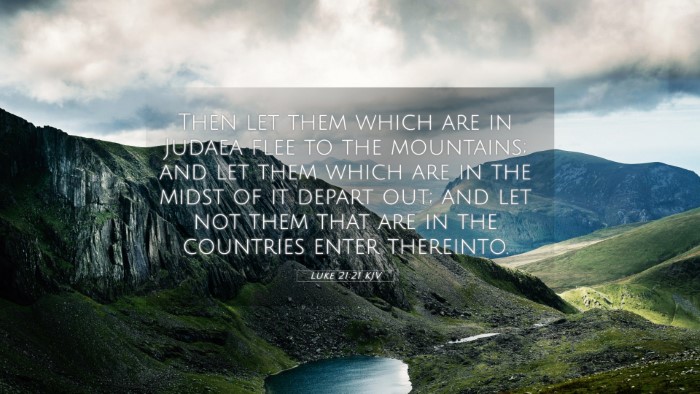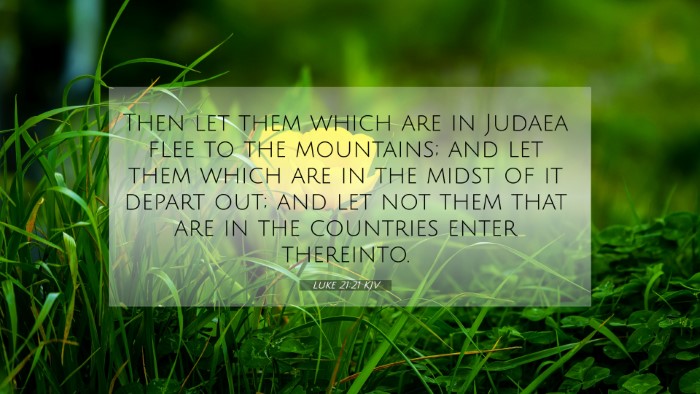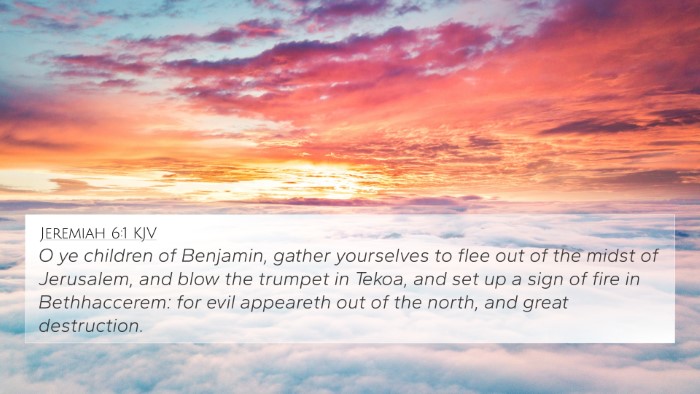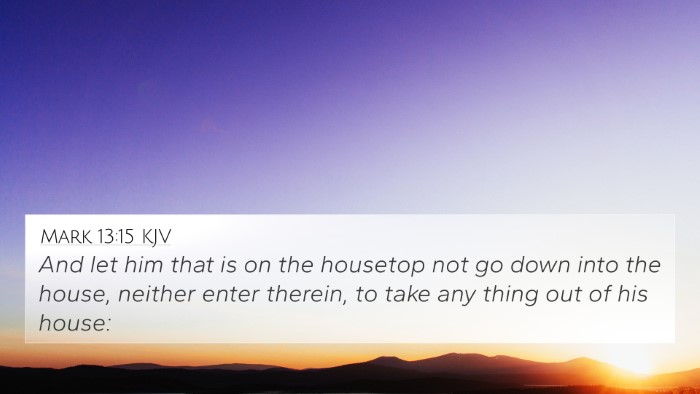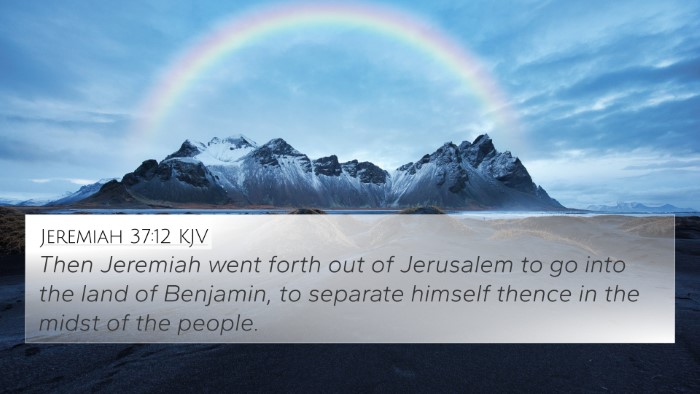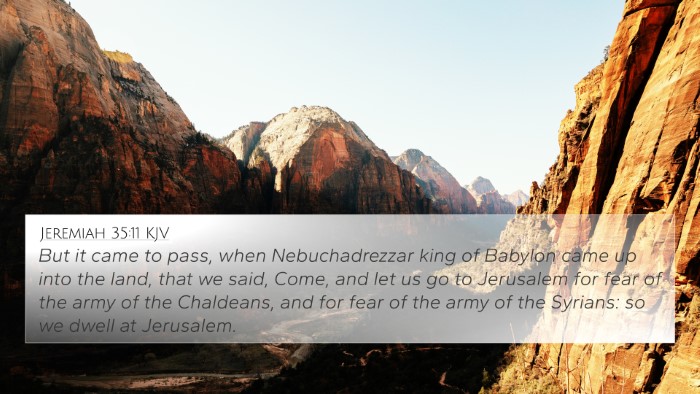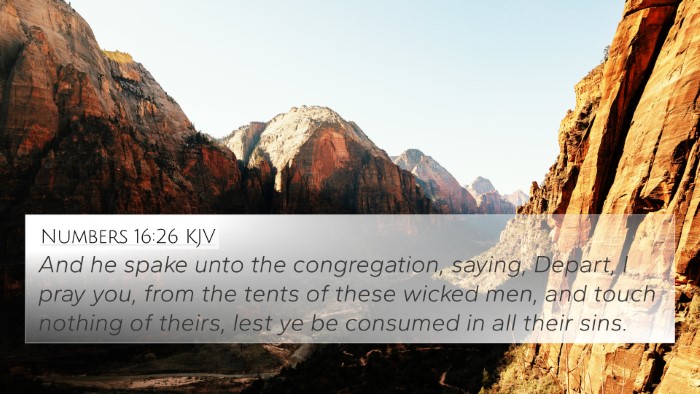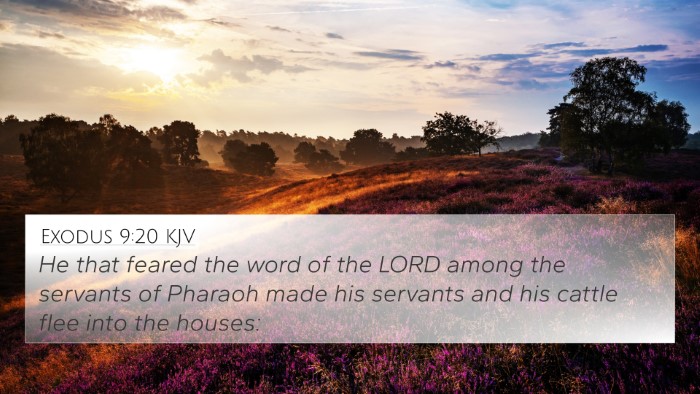Understanding Luke 21:21
Verse (Luke 21:21): "Then let those who are in Judea flee to the mountains, and let those who are inside the city depart, and let not those who are out in the country enter it."
This verse is a part of Jesus' prophetic discourse about the destruction of Jerusalem and the events surrounding it. Luke captures a direct warning from Jesus to his followers regarding the upcoming tumultuous times when Jerusalem would face siege and destruction.
Meaning and Insights
The exhortation to flee signifies not just a physical escape from danger but also reflects a deeper spiritual preparation that believers must exhibit during trials. The urgency of Jesus' message underscores the need for immediate action in dire circumstances.
- Matthew Henry's Commentary: Henry emphasizes the importance of heeding prophetic warnings and recognizes the significance of Jesus' foresight regarding future tribulations. He points out that faith must prepare the heart for challenges and trials ahead.
- Albert Barnes' Notes: Barnes discusses the historical context of this verse, explaining how it relates to the siege of Jerusalem in 70 AD. He stresses the practical advice offered to believers to ensure their safety during that catastrophic time.
- Adam Clarke's Commentary: Clarke offers a theological perspective that this warning is also indicative of God's desire for His people to be vigilant and responsive to divine warnings, stressing that the call to flee is both literal and metaphorical.
Thematic Connections
Luke 21:21 connects with multiple verses throughout the Bible, establishing a network of scriptural cross-references that enrich the understanding of divine protection and exhortations during perilous times. Below are key connections:
- Matthew 24:16: "Then let those who are in Judea flee to the mountains." This verse is often seen as a parallel, echoing the same urgency for believers to take action.
- Mark 13:14: "But when you see the abomination of desolation standing where it ought not to be, let those who are in Judea flee to the mountains." A similar warning in the Markan tradition highlights the importance of recognizing signs and responding accordingly.
- Revelation 18:4: "Then I heard another voice from heaven saying, 'Come out of her, my people, lest you take part in her sins, lest you share in her plagues!'" This progressive theme of separation from danger underscores the call for believers to remove themselves from corrupt influences.
- Jeremiah 51:6: "Flee from the midst of Babylon, and save your lives, each of you! Be not cut off in her punishment." This Old Testament reference reinforces the idea of fleeing from impending judgment.
- Isaiah 26:20: "Come, my people, enter your chambers, and shut your doors behind you; hide yourselves for a little while until the fury has past." This verse encourages confinement and protection in times of divine judgment.
- 2 Thessalonians 2:3-4: Paul speaks about the coming rebellion and the revealing of the man of lawlessness, encouraging vigilance amongst believers.
- Acts 11:28: Agabus warned of a coming famine, demonstrating the necessity of forewarning from God to prepare His people to flee from potential distress.
Comparative Analysis of Bible Verses
This verse is a profound reminder of God's care for His people and His directions in the face of danger. Believers today may reflect on Luke 21:21 as a call to stay spiritually alert and responsive to divine instructions in their lives.
Inter-Biblical Dialogue
The call to flee in Luke 21:21 not only shines within the context of Jesus’ teachings but weaves into the rich tapestry of biblical texts throughout both the Old and New Testament. By utilizing bible cross-reference tools and Bible concordance, seekers can uncover additional verses that provide deeper insights related to themes of expectation, alarm, and divine delivery.
Cross-Referencing Bible Study Methods
For those engaged in cross-reference Bible study, examining connections between Bible verses such as these can lead to a comprehensive understanding of biblical prophecy and the theological significance of God's directives.
To enhance study and application, believers can utilize a bible cross-reference guide coupled with bible reference resources to identify similar themes, thereby enriching their spiritual insights and practical responses to God's Word.
Conclusion
In conclusion, Luke 21:21 serves as a vital verse urging believers to be vigilant in times of potential peril. By deeply engaging with Bible verses that relate to each other, and through advanced bible cross-reference systems, the faithful can gain clarity and assurance in their walk with God amidst trials.
